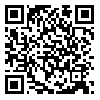BibTeX | RIS | EndNote | Medlars | ProCite | Reference Manager | RefWorks
Send citation to:
URL: http://irj.uswr.ac.ir/article-1-412-en.html
2- Babol Medical Sciences University, Babol, Iran.
Objectives: Reading is a language skill based on visual modality which recently is addressed as a facilitator of expressive language in children with Down syndrome. The aim was designing a whole word reading protocol and examining its effects on the language skills of children with Down syndrome.
Methods: A whole word reading protocol was developed and was examined through a single-subject study with time-series design. The protocol was made up of 50 pictures of nouns which were used through assessment and treatment. The vocabulary stimuli were selected from the receptive lexicon of each child. Three children with Down syndrome (trisomy 21) participated in the study (3 Females, mean age=6.1 years, mean IQ=44), and each participant received an individualized treatment up to 20 sessions. Visual graphs and C-statistic test were used for data analysis.
Results: As a result of the treatment, naming ability of treated words was increased statistically in all children (Z=2.46>1.64 Z=1.75>1.6 and Z=2.37>1.64).
Discussion: Whole word reading protocol seems to be effective in improving expressive vocabulary in children with Down syndrome.
Received: 2015/01/17 | Accepted: 2015/02/12 | Published: 2015/03/1





